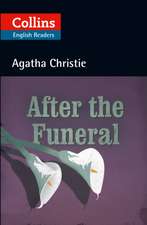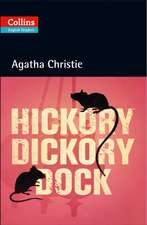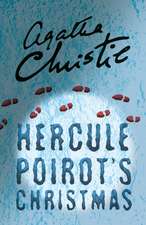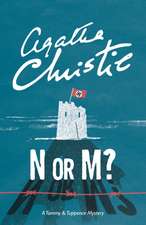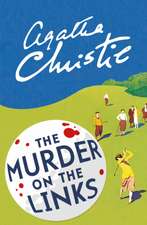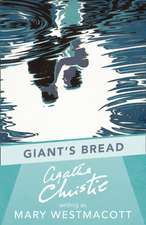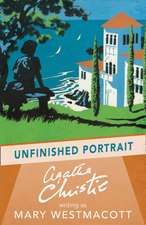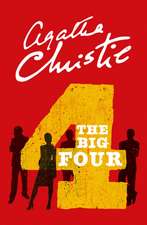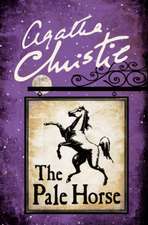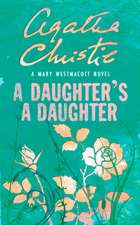The Mysterious Affair at Styles
Autor Agatha Christie Design de Rolf McEwenen Limba Engleză Paperback
The Mysterious Affair at Styles, a detective novel by "Agatha Christie," written in the middle of World War I.
Styles was Christie's first published novel, introducing "Hercule Poirot," Inspector Japp, and Arthur Hastings. Poirot, a Belgian refugee of the Great War, is settling in England near the home of Emily Inglethorp, who helped him to his new life. His friend Hastings arrives as a guest at her home. When the woman is killed, Poirot uses his detective skills to solve the mystery. This is also the setting of Curtain, Poirot's last case.
The story opens in England during World War I at Styles Court, an Essex country manor. Upon her husband's death, the wealthy widow, Emily Cavendish, inherited a life estate in Styles as well as the outright inheritance of the larger part of the late Mr. Cavendish's income. Mrs. Cavendish became Mrs. Inglethorp upon her recent marriage to a younger man, Alfred Inglethorp. Emily's two stepsons, John and Lawrence Cavendish, John's wife Mary and Cynthia Murdoch, also live at Styles. John Cavendish is the vested remainderman of Styles; that is, the property will pass to him upon his stepmother's death, per his late father's will. Lawrence Cavendish would also come into a considerable sum of money. The income left to Mrs Inglethorp by her late husband would be distributed according to her will, which she changes at least once per year. If she has not changed her will since her marriage, her husband will inherit that income.
"The Times" Literary Supplement gave the book an enthusiastic, if short, review, which stated: ""The only fault this story has is that it is almost too ingenious."" It went on to describe the basic set-up of the plot and concluded: ""It is said to be the author's first book, and the result of a bet about the possibility of writing a detective story in which the reader would not be able to spot the criminal. Every reader must admit that the bet was won.""
The "New York Times" Book Review, was also impressed:
"Though this may be the first published book of Miss Agatha Christie, she betrays the cunning of an old hand ... You must wait for the last-but-one chapter in the book for the last link in the chain of evidence that enabled Mr. Poirot to unravel the whole complicated plot and lay the guilt where it really belonged. And you may safely make a wager with yourself that until you have heard M. Poirot's final word on the mysterious affair at Styles, you will be kept guessing at its solution and will most certainly never lay down this most entertaining book."
Preț: 80.21 lei
Nou
15.35€ • 16.03$ • 12.67£
Carte indisponibilă temporar
Specificații
ISBN-10: 153094743X
Pagini: 244
Dimensiuni: 152 x 229 x 13 mm
Greutate: 0.33 kg
Descriere
The Mysterious Affair at Styles byAgatha Christie is the debut of thelegendary sleuth, Hercule Poirot.He must discover who poisoned awealthy spinster amid a chain of puzzles, including a secret alliance, a missingdocument and a welter of false leads.This mystery classic displays the authorat her hypnotically readable best.The Mysterious Affair at Styles byAgatha Christie is the debut of thelegendary sleuth, Hercule Poirot.He must discover who poisoned awealthy spinster amid a chain of puzzles, including a secret alliance, a missingdocument and a welter of false leads.This mystery classic displays the authorat her hypnotically readable best.
Notă biografică
Extras
I Go to Styles
The intense interest aroused in the public by what was known at the time as "The Styles Case" has now somewhat subsided. Nevertheless, in view of the world-wide notoriety which attended it, I have been asked, both by my friend Poirot and the family themselves, to write an account of the whole story. This, we trust, will eVectually silence the sensational rumours which still persist.
I will therefore brieXy set down the circumstances which led to my being connected with the aVair.
I had been invalided home from the Front; and, after spending some months in a rather depressing Convalescent Home, was given a month's sick leave. Having no near relations or friends, I was trying to make up my mind what to do, when I ran across John Cavendish. I had seen very little of him for some years. Indeed, I had never known him particularly well. He was a good Wfteen years my senior, for one thing, though he hardly looked his forty-Wve years. As a boy, though, I had often stayed at Styles, his mother's place in Essex.
We had a good yarn about old times, and it ended in his inviting me down to Styles to spend my leave there.
"The mater will be delighted to see you again?after all those years," he added.
"Your mother keeps well?" I asked.
"Oh, yes. I suppose you know that she has married again?"
I am afraid I showed my surprise rather plainly. Mrs. Cavendish, who had married John's father when he was a widower with two sons, had been a handsome woman of middle-age as I remembered her. She certainly could not be a day less than seventy now. I recalled her as an energetic, autocratic personality, somewhat inclined to charitable and social notoriety, with a fondness for opening bazaars and playing the Lady Bountiful. She was a most generous woman, and possessed a considerable fortune of her own.
Their country-place, Styles Court, had been purchased by Mr. Cavendish early in their married life. He had been completely under his wife's ascendancy, so much so that, on dying, he left the place to her for her lifetime, as well as the larger part of his income; an arrangement that was distinctly unfair to his two sons. Their stepmother, however, had always been most generous to them; indeed, they were so young at the time of their father's remarriage that they always thought of her as their own mother.
Lawrence, the younger, had been a delicate youth. He had qualiWed as a doctor but early relinquished the profession of medicine, and lived at home while pursuing literary ambitions; though his verses never had any marked success.
John practised for some time as a barrister, but had Wnally settled down to the more congenial life of a country squire. He had married two years ago, and had taken his wife to live at Styles, though I entertained a shrewd suspicion that he would have preferred his mother to increase his allowance, which would have enabled him to have a home of his own. Mrs. Cavendish, however, was a lady who liked to make her own plans, and expected other people to fall in with them, and in this case she certainly had the whip hand, namely: the purse strings.
John noticed my surprise at the news of his mother's remarriage and smiled rather ruefully.
"Rotten little bounder too!" he said savagely. "I can tell you, Hastings, it's making life jolly diYcult for us. As for Evie?you remember Evie?"
"No."
"Oh, I suppose she was after your time. She's the mater's factotum, companion, Jack of all trades! A great sport?old Evie! Not precisely young and beautiful, but as game as they make them."
"You were going to say???"
"Oh, this fellow! He turned up from nowhere, on the pretext of being a second cousin or something of Evie's, though she didn't seem particularly keen to acknowledge the relationship. The fellow is an absolute outsider, anyone can see that. He's got a great black beard, and wears patent leather boots in all weathers! But the mater cottoned to him at once, took him on as secretary?you know how she's always running a hundred societies?"
I nodded.
"Well, of course the war has turned the hundreds into thousands. No doubt the fellow was very useful to her. But you could have knocked us all down with a feather when, three months ago, she suddenly announced that she and Alfred were engaged! The fellow must be at least twenty years younger than she is! It's simply bare-faced fortune hunting; but there you are?she is her own mistress, and she's married him."
"It must be a diYcult situation for you all."
"DiYcult! It's damnable!"
Thus it came about that, three days later, I descended from the train at Styles St. Mary, an absurd little station, with no apparent reason for existence, perched up in the midst of green Welds and country lanes. John Cavendish was waiting on the platform, and piloted me out to the car.
"Got a drop or two of petrol still, you see," he remarked. "Mainly owing to the mater's activities."
The village of Styles St. Mary was situated about two miles from the little station, and Styles Court lay a mile the other side of it. It was a still, warm day in early July. As one looked out over the Xat Essex country, lying so green and peaceful under the afternoon sun, it seemed almost impossible to believe that, not so very far away, a great war was running its appointed course. I felt I had suddenly strayed into another world. As we turned in at the lodge gates, John said:
"I'm afraid you'll Wnd it very quiet down here, Hastings."
"My dear fellow, that's just what I want."
"Oh, it's pleasant enough if you want to lead the idle life. I drill with the volunteers twice a week, and lend a hand at the farms. My wife works regularly 'on the land.' She is up at Wve every morning to milk, and keeps at it steadily until lunch-time. It's a jolly good life taking it all round?if it weren't for that fellow Alfred Inglethorp!" He checked the car suddenly, and glanced at his watch. "I wonder if we've time to pick up Cynthia. No, she'll have started from the hospital by now."
"Cynthia! That's not your wife?"
"No, Cynthia is a protégée of my mother's, the daughter of an old schoolfellow of hers, who married a rascally solicitor. He came a cropper, and the girl was left an orphan and penniless. My mother came to the rescue, and Cynthia has been with us nearly two years now. She works in the Red Cross Hospital at Tadminster, seven miles away."
As he spoke the last words, we drew up in front of the Wne old house. A lady in a stout tweed skirt, who was bending over a Xower bed, straightened herself at our approach.
"Hullo, Evie, here's our wounded hero! Mr. Hastings?Miss Howard."
Miss Howard shook hands with a hearty, almost painful, grip. I had an impression of very blue eyes in a sunburnt face. She was a pleasant-looking woman of about forty, with a deep voice, almost manly in its stentorian tones, and had a large sensible square body, with feet to match?these last encased in good thick boots. Her conversation, I soon found, was couched in the telegraphic style.
"Weeds grow like house aWre. Can't keep even with 'em. Shall press you in. Better be careful."
"I'm sure I shall be only too delighted to make myself useful," I responded.
"Don't say it. Never does. Wish you hadn't later."
"You're a cynic, Evie," said John, laughing. "Where's tea to-day?inside or out?"
"Out. Too Wne a day to be cooped up in the house."
"Come on then, you've done enough gardening for to-day. '"The labourer is worthy of his hire,' you know. Come and be refreshed."
"Well," said Miss Howard, drawing oV her gardening gloves, "I'm inclined to agree with you."
She led the way round the house to where tea was spread under the shade of a large sycamore.
A Wgure rose from one of the basket chairs, and came a few steps to meet us.
"My wife, Hastings," said John.
I shall never forget my Wrst sight of Mary Cavendish. Her tall, slender form, outlined against the bright light; the vivid sense of slumbering Wre that seemed to Wnd expression only in those wonderful tawny eyes of hers, remarkable eyes, diVerent from any other woman's that I have ever known; the intense power of stillness she possessed, which nevertheless conveyed the impression of a wild untamed spirit in an exquisitely civilised body?all these things are burnt into my memory. I shall never forget them.
She greeted me with a few words of pleasant welcome in a low clear voice, and I sank into a basket chair feeling distinctly glad that I had accepted John's invitation. Mrs. Cavendish gave me some tea, and her few quiet remarks heightened my Wrst impression of her as a thoroughly fascinating woman. An appreciative listener is always stimulating, and I described, in a humorous manner, certain incidents of my Convalescent Home, in a way which, I Xatter myself, greatly amused my hostess. John, of course, good fellow though he is, could hardly be called a brilliant conversationalist.
At that moment a well remembered voice Xoated through the open French window near at hand:
"Then you'll write to the Princess after tea, Alfred? I'll write to Lady Tadminster for the second day, myself. Or shall we wait until we hear from the Princess? In case of a refusal, Lady Tadminster might open it the Wrst day, and Mrs. Crosbie the second. Then there's the Duchess?about the school fête."
There was the murmur of a man's voice, and then Mrs. Inglethorp's rose in reply:
"Yes, certainly. After tea will do quite well. You are so thoughtful, Alfred dear."
The French window swung open a little wider, and a handsome white-haired old lady, with a somewhat masterful cast of features, stepped out of it on to the lawn. A man followed her, a suggestion of deference in his manner.
Mrs. Inglethorp greeted me with eVusion.
"Why, if it isn't too delightful to see you again, Mr. Hastings, after all these years. Alfred, darling, Mr. Hastings?my husband."
I looked with some curiosity at "Alfred darling." He certainly struck a rather alien note. I did not wonder at John objecting to his beard. It was one of the longest and blackest I have ever seen. He wore gold rimmed pince-nez, and had a curious impassivity of feature. It struck me that he might look natural on a stage, but was strangely out of place in real life. His voice was rather deep and unctuous. He placed a wooden hand in mine and said:
"This is a pleasure, Mr. Hastings." Then, turning to his wife: "Emily dearest, I think that cushion is a little damp."
She beamed fondly on him, as he substituted another with every demonstration of the tenderest care. Strange infatuation of an otherwise sensible woman!
With the presence of Mr. Inglethorp, a sense of constraint and veiled hostility seemed to settle down upon the company. Miss Howard, in particular, took no pains to conceal her feelings. Mrs. Inglethorp, however, seemed to notice nothing unusual. Her volubility, which I remembered of old, had lost nothing in the intervening years, and she poured out a steady Xood of conversation, mainly on the subject of the forthcoming bazaar which she was organizing and which was to take place shortly. Occasionally she referred to her husband over a question of days or dates. His watchful and attentive manner never varied. From the very Wrst I took a Wrm and rooted dislike to him, and I Xatter myself that my Wrst judgments are usually fairly shrewd.
Presently Mrs. Inglethorp turned to give some instructions about letters to Evelyn Howard, and her husband addressed me in his painstaking voice:
"Is soldiering your regular profession, Mr. Hastings?"
"No, before the war I was in Lloyd's."
"And you will return there after it is over?"
"Perhaps. Either that or a fresh start altogether."
Mary Cavendish leant forward.
"What would you really choose as a profession, if you could just consult your inclination?"
"Well, that depends."
"No secret hobby?" she asked. "Tell me?you're drawn to something? Every one is?usually something absurd."
"You'll laugh at me."
She smiled.
"Perhaps."
"Well, I've always had a secret hankering to be a detective!"
"The real thing?Scotland Yard? Or Sherlock Holmes?"
"Oh, Sherlock Holmes by all means. But really, seriously, I am awfully drawn to it. I came across a man in Belgium once, a very famous detective, and he quite inXamed me. He was a marvellous little fellow. He used to say that all good detective work was a mere matter of method. My system is based on his?though of course I have progressed rather further. He was a funny little man, a great dandy, but wonderfully clever."
"Like a good detective story myself," remarked Miss Howard. "Lots of nonsense written, though. Criminal discovered in last chapter. Every one dumfounded. Real crime?you'd know at once."
"There have been a great number of undiscovered crimes," I argued.
"Don't mean the police, but the people that are right in it. The family. You couldn't really hoodwink them. They'd know."
"Then," I said, much amused, "you think that if you were mixed up in a crime, say a murder, you'd be able to spot the murderer right oV?"
"Of course I should. Mightn't be able to prove it to a pack of lawyers. But I'm certain I'd know. I'd feel it in my Wnger-tips if he came near me."
"It might be a 'she,' " I suggested.
"Might. But murder's a violent crime. Associate it more with a man."
"Not in a case of poisoning." Mrs. Cavendish's clear voice startled me. "Dr. Bauerstein was saying yesterday that, owing to the general ignorance of the more uncommon poisons among the medical profession, there were probably countless cases of poisoning quite unsuspected."
"Why, Mary, what a gruesome conversation!" cried Mrs. Inglethorp. "It makes me feel as if a goose were walking over my grave. Oh, there's Cynthia!"
A young girl in V.A.D. uniform ran lightly across the lawn.
"Why, Cynthia, you are late to-day. This is Mr. Hastings?Miss Murdoch."
Cynthia Murdoch was a fresh-looking young creature, full of life and vigour. She tossed oV her little V.A.D. cap, and I admired the great loose waves of her auburn hair, and the smallness and whiteness of the hand she held out to claim her tea. With dark eyes and eyelashes she would have been a beauty.
She Xung herself down on the ground beside John, and as I handed her a plate of sandwiches she smiled up at me.
Recenzii
that its greatest practitioner . . . has been Agatha Christie.”
—The New York Times Book Review



